As promised last month, here is part II of our special two-part text interview with leading British cryptozoologist Richard Freeman. In Part One we covered straight Cryptozoology, discussing everything from Alien Big Cats to the British Bigfoot. In this installement, however, we're going to concentrate on the 45 year long relationship between monsters and Freeman's other obsession ... the Sci-Fi World of Doctor Who. Don't worry, that won't stop us discussing some Esoterica along the way ...

Richard Thomas: Welcome back! Thanks for agreeing to do part II of this special two-part text interview. Part I for Room 101 got a lot of great feedback so I'm sure the BoA readers will be looking forward to this one.
First, in part I, you said that Doctor Who, the Jon Pertwee era in particular, played a huge part in you becoming interested in Cryptozoology and other Fortean type subjects. What do you think was your favorite Doctor Who monster growing up and why?
Richard Freeman: I always loved the Sea Devils. They look just great. I love reptiles and have worked extensively with them. I was on the side of the Sea Devils rather than the humans in that story. Dale Russell and Ron Seguin ripped the Sea Devils off in 1982 with their 'dinosaurid,' a hypothetical intelligent, humanoid dinosaur they postulated could have evolved from the therapod dinosaur 'troodon'.
The god awful series V in the 1980s also stole the idea as did the mind bendingly unimaginative Star Trek Voyager in the episode Distant Origins.
None of these feeble imitations can hold a candle to the Sea Devils.
| 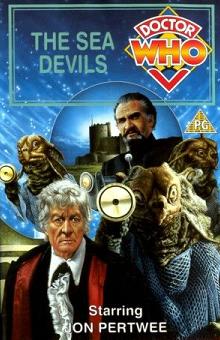 |
Richard Thomas: The cult series, of course, is famous today for its alien monsters. However, the show was originally envisioned as a semi-educational series for children. The idea being that kids would lean about history via the Doctor's adventures back in time. With this in mind, why do you think the monster stories quickly killed-off the more straight historical dramas like The Aztecs and The Romans?
Richard Freeman: Oh god yes. Who wants six episodes set during the French Revolution when you can have shadowy monsters and horrific beasts! Doctor Who is less about Science Fiction and more about Horror. I've never liked the space ship and ray gun type show. That's why I like Doctor Who. I really love good horror, which is why I think Buffy the Vampire Slayer is the worst show in TV history (and I'm including Jim Davidson's Big Break in that equation) because it bastardized horror. It tried to pass itself off as horror when it was a shit teen soap opera. Joss Whedon wouldn't know horror if it bit him in the face. Doctor Who is pure horror.
| 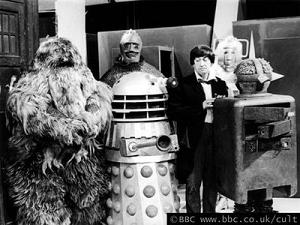 |
Richard Thomas: Here here!
The two most successful monsters have to be the Daleks and Cybermen. What are some of your favorite stories featuring them and did you get goose bumbs like me when they finally faced off in Doomsday?
Richard Freeman: I always thought the Daleks were better than the Cybermen. Cybermen have no emotions and hence cannot be evil. Daleks are all that is worst about humanity boiled down into its most intense form. This with their totally inhuman form and tank like invulnerability make them very frightening. A Dalek kills for spite not logic.
|
The best Dalek story for me is still Genesis of the Daleks as it introduced Davros. Along with The Joker from Batman, I think Davros is the most effective fictional villain ever. The Nazi symbolism in the story is quite disturbing as well. The implication being that we are the real Daleks.
| 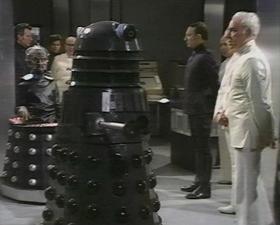 |
The best Cyberman story I think was the recent Rise of the Cybermen / Age of Steel. They finally looked like they could actually do some damage for once, rather than just looking like men in silver suits. Once again, of course, the woefully poor Star Trek ripped off another Doctor Who monster with their pathetic looking Borg. The Cybermen have been around since 1966 and would kick the Borg's collective arse!
I loved Army of Ghosts / Doomsday. The return of the Daleks at the end of the first episode is my favorite cliffhanger in the show's history. The fight was a forgone conclusion though. We all knew who would win in a Dalek / Cyberman punch up. The bitchy banter between them was great!
Richard Thomas: For me the really scary thing about these two cyborg species has to be that we seem to be becoming more and more like them all the time. Worse still there are actually serious scientists like Professor
Kevin Warwick who actually advocate transforming the human race via cybernetics and other advanced technologies. Do you share my concerns about real life John Lumics (creator of the new series Cybermen) at all?
Richard Freeman: Yes, I think we are over reliant on machines. I'm a bit of a technophobe myself. I don't drive and only started using computers in the late 1990s! I often thought of Kevin Warwick as the first of the Cybermen! I think organics will always win over machines though. We can think outside of the box. These days 'soft technologies' like genetics are taking over from cybernetics. I think the real can of worms is genetics. I think the can is not only open; it's been kicked over! In theory it's already possible to breed a human chimpanzee hybrid (imagine something with the brutal, unrestrained savagery of a chimp and the spite and cunning of a human!) and to breed rats the size of dogs.
|  |
Richard Thomas: One of the best remembered monsters of the black and white era has to be the Yeti robots of the Great Intelligence. Later in the series, the Loch Ness monster appeared in Terror of the Zygons. Personally I think this is great because it gets the young viewers interested in these topics, but as a cryptozoologist what are your thoughts on mixing fact with fiction?
Richard Freeman: Doctor Who, and the Jon Pertwee years in particular were my inspiration to become a cryptozoologist. The show was my first real exposure to monsters. I don't mind mixing fact with fiction as long as it is stated that it is fiction. I don't like 'mockumentories' that try to pass themselves off as real investigations.
There have been a couple of really bad Loch Ness programs. One built up the idea of the monster as a prehistoric marine reptile then tried to make itself look clever by saying how such a creature could not live in Loch Ness. Ergo the program's message was that the monster, if it existed, had to be a plesiosaur. Plesiosaurs could not live in Loch Ness so there was no such thing as the Loch Ness Monster. This is bollocks. Nobody who has seriously studied the phenomena thinks the monster is a plesiosaur. The smart money is on some kind of huge fish possibly a giant eel.
Richard Thomas:
The Abominable Snowmen, of course, ends with the Doctor's friend Professor Travis discovering a real flesh and blood snowman. As someone who has actually gone on expeditions searching for similar cryptozoological creatures, when, and perhaps more importantly, how do you think such a discovery will be made (if ever) in the real world?
Richard Freeman: There are a number of quite distinct, upright walking, hair covered creatures. Some, like the yeti seem to be huge bipedal apes, perhaps a surviving form of Gigantopithecus blacki a huge ape from China and India inthe Pleistocene epoch. The almasty of Russia and Central Asia seems to be more human like and is possibly a unkown decendent of Homo erectus.
I think the Russian Caucasus Mountains will be the place where a hominid will first be discovered. I think I may have come to within 12 feet of one on an abandoned farm at 2.30 am last summer. The almasty seems to approach human habitation in this area. People do not shoot at or hunt the creature so it has little fear of them. Here I think here is a chance of some level of integration with a relic hominid.
| 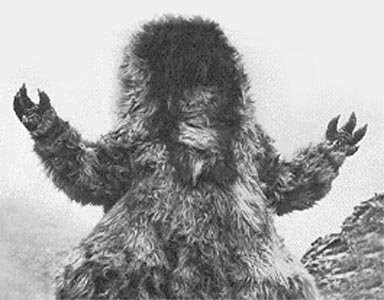 |
As for mystery apes, I think the orang-pendek of Sumatra will be found first as its jungle habitat shrinks. These small, upright apes will often enter semi-cultivated areas near to villages. The mighty Yeti, in the vastness of its remote mountain forests, will probably escape discovery for quite some time.
Richard Thomas: If you were ever approached by the
Doctor Who production team about suggesting a new monster for the series from the creatures you have investigated, which one would you pick and what spin might you put on them? (eg instead of normal Yeti
Doctor Who had robots.)
Richard Freeman: The dragon! It is the king of monsters, the most ancient, powerful and widespread of all legendary beasts. Forget the devil in Satan Pit, the dragon is the daddy! It pre-dates daemons, vampires, werewolves and all others. Dragon sightings are surprisingly common today, particularly in Asia. In the West we associate them with fire but most other cultures associate them with the element of water and portray them as serpentine beasts living in or around water.
I would write a Doctor Who story where dragons are a race of ancient reptiles that existed in the Universe before our own. To escape its destruction they projected themselves through time to our Universe. The Time Lords saw this as a crime against time (something from a past Universe existing in the modern one) and tried to hunt them down. The Time Lords were badly defeated and the dragons went into eons long hibernation after the battle. They now occur in the legends of every culture in the Universe and have spawned cults that worship them (much like the Elder Gods of HP Lovecraft). Some of them are beginning to awaken.
| 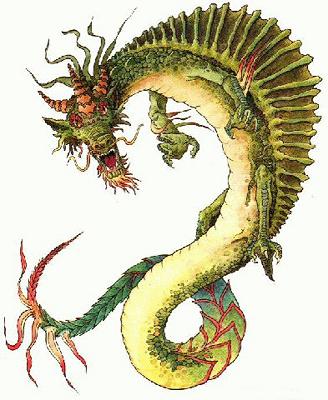 |
As for a setting there could be many choices. I could base it around the Chinese legend of the Ying-lung, a winged dragon who killed the Chinese god of war (distorted memories of the battle with the Time lords). Or I could set it in modern day Japan as a tribute to the Godzilla films. Huge dragons rampage through Tokyo and create thought form servants that recall the yokai (ghosts and monsters of Japanese legend) such as the kappa, tengu, mouryo, oni, yunki-onna and so on. Or I could set it in rural England where a Wicker Man style cult worshiping a slumbering dragon plan to awaken it.
Richard Thomas: Two monsters rumored to be returning sometime soon are the Silurians and their aquatic cousins the Sea Devils, the original reptilian rulers of planet Earth. If you were writing their return story what would you do?
Richard Freeman: I would have the Tardis land in what the Doctor thinks is modern day London only to find that it is a tropical jungle full of dinosaurs. The Sea Devils and Silurians now rule the Earth and are doing a better job of it than humans!
Richard Thomas: While on the topic of
Doctor Who's Earth Reptiles, what are your thoughts on Mac Tonnies' controversial cryptoterrestrial hypothesis?
Richard Freeman: I had never heard of the guy before you mentioned him. I have never bought the extraterrestrial hypothesis. The so-called 'aliens' are generally too humanoid looking to have evolved on another biosphere. If 'alien' encounters are objective events (and that's a big if) I think the creatures are coming through time or dimensions rather than from outer space. There seems to be a strange analogue with fairy lore as well.
|
Richard Thomas: We're probably in agreement there. The more I look into the the topic of UFOs the more I think they're Earth based rather than from outer space. Though probably in some other dimension or time like you say.
Mac Tonnies, of course, is also known for his book on Mars anomalies. The Ice Warriors of Mars are one of the big four recurring Doctor Who monsters (with the Daleks, Cybermen and Sontarians) what do you think of the idea that intelligent life could have once existed on the red planet?
Richard Freeman: I think if life ever existed on Mars it would have been single celled.
| 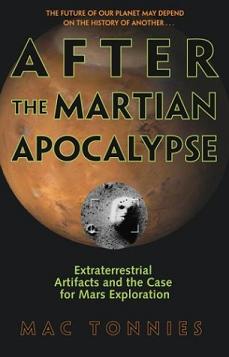 |
Richard Thomas: That's probably the most likely scenario but I wouldn't rule out the idea that Mars might have been colonized by an advanced civilization millions of years ago. Kind of like the backstory to the Pyramids of Mars. Why not remind our readers again about your upcoming books and stuff.
Richard Freeman: I have two books out now, Dragons; More than a Myth? from CFZ Press and Explore Dragons from Heart of Albion. My new book The Great Yokai Encyclopedia; an A to Z of Japanese Monsters will be out later this year from CFZ Press.
You can follow my cryptozoological expeditions at www.cfz.org.uk
Richard Thomas: Thanks mate, hope we can do this again sometime.
Richard Thomas, BoA UK Correspondent and Columnist.

